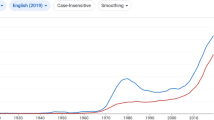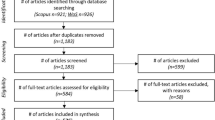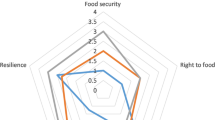Abstract
Achieving food system sustainability is one of the more pressing challenges of this century. Over the last decades, experts from diverse disciplines and intellectual traditions have worked to document the critical threats to food system sustainability and to define an appropriate agenda for action. Nevertheless, these efforts have tended to focus selectively on only a few components of the food system or have tended to be framed in particular discourses. Depending on the point of departure, what aspects of the food system are considered threatened, and what must be sustained, can differ greatly between perspectives. In this article, we draw from systems-thinking and social-ecological systems concepts to focus on the underlying process-related attributes that could support a more sustainable food system. We then examine the support for specific system attributes in six different knowledge domains addressing sustainable agriculture and food. From this review, we identify five system attributes—diversity, modularity, transparency, innovation and congruence—that are repeatedly featured in the different knowledge domains as critical aspects of food system sustainability. We argue that in the face of considerable complexity and high uncertainty, these attributes can serve as a guide to conceptualizing food system choices adaptively and iteratively.

Similar content being viewed by others
Abbreviations
- FSS:
-
Food system sustainability
References
Allen, P. 1999. Reweaving the food security safety net: Mediating entitlement and entrepreneurship. Agriculture and Human Values 16: 117–129.
Allen, P. 2010. Realizing justice in local food systems. Cambridge Journal of Regions, Economy and Society 3: 295–308.
Altieri, M. 1995. Agroecology: The Science of Sustainable Agriculture. Boulder, CO: Westview Press.
Altieri, A., and P. Rosset 2000. Ten reasons why biotechnology will not ensure food security, protect the environment and reduce poverty in the developing world. AgBioForum 2, Art. 3.
Altieri, M. A., P. M. Rosset, and L. A. Thrupp. 1998. The potential of agroecology to combat hunger in the developing world. A 2020 Vision for Food, Agriculture, and the Environment. 2020 Brief 55. Washington, DC: IFPRI.
Anderson, M.D. 2008. Rights-based food systems and the goals of food systems reform. Agriculture and Human Values 25: 593–608.
Auld, G. 2010. Assessing certification as governance: Effects and broader consequences for coffee. Journal of Environment and Development 19: 215–241.
Bacon, C., V.E. Mendez, M.E. Flores Gómez, D. Stuart, and S.R. Díaz Flores. 2008. Are sustainable coffee certifications enough to secure farmer livelihoods? The Millenium Development Goals and Nicaragua’s Fair Trade cooperatives. Globalizations 5: 259–274.
Bacon, C.M., 2010. Who decides what is fair in fair trade? The agri-environmental governance of standards, access, and price. The Journal of Peasant Studies 37(1):111–147.
Bausch, J.C., L. Bojórquez-Tapia, and H. Eakin. 2014. Agro-environmental sustainability assessment using multicriteria decision analysis and system analysis. Sustainability Science 9:303–319
Bebbington, A. 1999. Capitals and capabilities: A framework for analyzing peasant viability, rural livelihoods and poverty. World Development 27: 2021–2044.
Beddington, J.R., M. Asaduzzaman, M.E. Clark, A. Fernández Bremauntz, M.D. Guillou, D.J.B. Howlett, M.M. Jahn, E. Lin, T. Mamo, C. Negra, C.A. Nobre, R.J. Scholes, N. Van Bo, and J. Wakhungu. 2012. What next for agriculture after Durban? Science 335: 289–290. doi:10.1126/science.1217941.
Bellver, A. and D. Kaufmann. 2005. ‘Transparenting transparency’: Initial empirics and policy applications. Preliminary draft for discussion and comments. World Bank Discussion Paper. Washington, DC: World Bank.
Berkes, F. and C. Folke, eds. 1998. Linking Social and Ecological Systems: Management Practices and Social Mechanisms for Building Resilience, New York, NY: Cambridge University Press.
Biggs, R., M. Schlüter, D. Biggs, E.L. Bohensky, S. BurnSilver, G. Cundill, V. Dakos, T.M. Daw, L.S. Evans, and K. Kotschy. 2012. Toward principles for enhancing the resilience of ecosystem services. Annual Review of Environment and Resources 37: 421–448.
Block, D., N. Chávez, E. Allen, and D. Ramirez. 2011. Food sovereignty, urban food access, and food activism: Contemplating the connections through examples from Chicago. Agriculture and Human Values 29: 201–215.
Boulding, K. 1956. General systems theory-the skeleton of science. Management Science 2: 197–208.
Busch, L., and C. Bain. 2004. New! Improved? The transformation of the global agrifood system. Rural Sociology 69: 321–346.
Buttel, F.H. 1997. Some observations on agro-food change and the future of agricultural sustainability movements. In Globalising food, ed. David Goodman, and Michael Watts, 344–365. New York: Routledge.
Chappell, M.J., and L. LaValle. 2011. Food security and biodiversity: Can we have both? An agroecological analysis. Agriculture and Human Values 28: 3–26.
Clapp, J. 2003. Transnational corporate interests and global environmental governance: Negotiating rules for agricultural biotechnology and chemicals. Environmental Politics 12: 1–23.
Community Food Security Coalition 2012. Community food security. http://www.foodsecurity.org/aboutcfsc.html, Accessed October 2014.
Connelly, S., S. Markey, and M. Roseland. 2011. Bridging sustainability and the social economy: Achieving community transformation through local food initiatives. Critical Social Policy 31: 308–324.
Cox, M., G. Arnold, and S. Villamayor Tomas. 2010. A review of design principles for community-based natural resource management. Ecology and Society 15(4): 38.
Dahlberg, K.A. 1994. A transition from agriculture to regenerative food systems. Futures 26: 170–179.
DeLind, L.B. 2011. Are local food and the local food movement taking us where we want to go? Or are we hitching our wagons to the wrong stars? Agriculture and Human Values 28: 273–283.
Dowler, E. 2003. Food and poverty: Insights from the “North”. Development Policy Review 21: 569–580.
Eakin, H., and L.A. Bojorquez-Tapia. 2008. Insights into the composition of household vulnerability from multicriteria decision analysis. Global Environmental Change-Human and Policy Dimensions 18: 112–127.
Ellis, E.C., and N. Ramankutty. 2008. Putting people in the map: Anthropogenic biomes of the world. Frontiers in Ecology and the Environment 6: 439–447.
Ellis, F. 2000. Rural livelihoods and diversity in developing countries. Oxford: Oxford University Press.
Ely, A., A. Smith, A. Stirling, M. Leach, and I. Scoones. 2013. Innovation politics post-Rio+20: Hybrid pathways to sustainability? Environment and Planning C-Government and Policy 31: 1063–1081.
Ericksen, P. 2008. Conceptualizing food systems for global environmental change research. Global Environmental Change 18: 234–245.
Feenstra, G. 2002. Creating space for sustainable food systems: Lessons from the field. Agriculture and Human Values 19: 99–106.
Foley, J.A., N. Ramankutty, K.A. Brauman, E.S. Cassidy, J.S. Gerber, M. Johnston, N.D. Mueller, C. O’Connell, D.K. Ray, P.C. West, C. Balzer, E.M. Bennett, S.R. Carpenter, J. Hill, C. Monfreda, S. Polasky, J. Rockstrom, J. Sheehan, S. Siebert, D. Tilman, and D.P.M. Zaks. 2011. Solutions for a cultivated planet. Nature 478: 337–342.
Food and Agriculture Organization. 2013. The state of food insecurity in the world. Rome: Food and Agriculture Organization.
Foran, T., J.R.A. Butler, L.J. Williams, W.J. Wanjura, A. Hall, L. Carter, and P. Carberry. 2014. Taking complexity in food systems seriously: An interdisciplinary analysis. World Development 61: 85–101.
Fraser, E.D.G., W. Mabee, and F. Figge. 2005. A framework for assessing the vulnerability of food systems to future shocks. Futures 37: 465–479.
Gibson, R.B. 2006. Sustainability assessment: Basic components of a practical approach. Impact Assessment and Project Appraisal 24: 170–182.
Gliessman, S.R. 1991. Ecological basis of traditional management of wetlands in tropical México: Learning from agroecosystem models. In Biodiversity: Culture, conservation and ecodevelopment, ed. M.L. Oldfield, and J.B. Alcorn. Boulder: Westview Press.
Godfray, H.C.J., J.R. Beddington, I.R. Crute, L. Haddad, D. Lawrence, J.F. Muir, J. Pretty, S. Robinson, S. Thomas, and C. Toulmin. 2010. Food security: The challenge of feeding 9 billion people. Science 327: 812–818.
Goodman, D. and M. Watts, eds. 1997. Globalising food: Agrarian questions and global restructuring. London: Routledge.
Guthman, J. 2007. Worlds of food: Place, power, and provenance in the food chain. Economic Geography 83: 215–216.
Guthman, J. 2008. Thinking inside the neoliberal box: The micro-politics of agro-food philanthropy. Geoforum 39: 1241–1253. doi:10.1016/j.geoforum.2006.09.001.
Hamm, M.W. 2009. Principles for framing a healthy food system. Journal of Hunger and Environmental Nutrition 4: 241–250.
Hammond, R.A., and L. Dubé. 2012. A systems science perspective and transdisciplinary models for food and nutrition security. Proceedings of the National Academy of Sciences of the United States of America 109: 12356–12363.
Harvey, C.A., O. Komar, R. Chazdon, B.G. Ferguson, B. Finegan, D.M. Griffith, M. Martínez Ramos, H. Morales, R. Nigh, and L. Soto-Pinto. 2008. Integrating agricultural landscapes with biodiversity conservation in the Mesoamerican hotspot. Conservation Biology 22: 8–15.
Heller, M.C., and G.A. Keoleian. 2003. Assessing the sustainability of the US food system: A life cycle perspective. Agricultural Systems 76: 1007–1041.
Hodbod, J., and H. Eakin. 2015. Adapting a social-ecological resilience framework for food systems. Journal of Environmental Studies and Sciences 5: 474–484.
Holben, D.H. 2010. Farmers’ markets: Fertile ground for optimizing health. Journal of the American Dietetic Association 110: 364–365. doi:10.1016/j.jada.2009.11.015.
Howard, P. 2009. Visualizing consolidation in the global seed industry: 1996–2008. Sustainability 1: 1266–1287.
IAASTD 2008. International Assessment on Agriculture Science and Technology for Development: Executive Summary of the Synthesis Report. Johannesburg: IAASTD (http://www.agassessment.org).
Isakson, S.R. 2009. No hay ganancia en la milpa: The agrarian question, food sovereignty, and the on-farm conservation of agrobiodiversity in the Guatemalan highlands. The Journal of Peasant Studies 36: 725–759.
Keenan, D.P., C. Olson, J.C. Hersey, and S.M. Parmer. 2001. Measures of food insecurity/security. Journal of Nutrition Education 33(Supplement 1): S49–S58.
Kirwin, J., I. Brian, D. Maye, and J. Carey. 2013. Grassroots social innovations and food localisation: An investigation of the Local Food programme in England. Global Environmental Change 23: 830–837.
Leach, M., I. Scoones, and A. Stirling. 2010. Dynamic sustainabilities: Techologies, environment and social justice. New York: Earthscan.
Leff, E. 1995. Green production: Toward an environmental rationality. New York: Guilford Press.
Lélé, S.M. 1991. Sustainable development: A critical review. World Development 19: 607–621.
Levin, S., T. Xepapadeas, A.S. Crépin, J. Norberg, A. de Zeeuw, C. Folke, T. Hughes, K. Arrow, S. Barrett, G. Daily, P. Ehrlich, N. Kautsky, K.G. Mäler, S. Polasky, M. Troell, J.R. Vincent, and B. Walker. 2013. Social-ecological systems as complex adaptive systems: Modeling and policy implications. Environment and Development Economics 18(2): 111–132.
Licker, R., M. Johnston, J.A. Foley, C. Barford, C.J. Kucharik, C. Monfreda, and N. Ramankutty. 2010. Mind the gap: How do climate and agricultural management explain the ‘yield gap’ of croplands around the world? Global Ecology and Biogeography 19: 769–782.
MacDonald, K. 2007. Globalizing justice within coffee supply chains? Fair trade, Starbucks and the transformation of supply chain governance. Third World Quarterly 28: 793–812.
Marsden, T. 1997. Creating space for food: The distinctiveness of recent agrarian development. In Globalizing food: Agrarian questions and global restructuring, ed. D. Goodman, and M. Watts, 169–191. London: Routledge.
Mather, A. 1992. The forest transition. Area 24(4): 367–379.
Mather, A. 2001. The transition from deforestation to reforestation in Europe. In Agricultural technologies and tropical deforestation, ed. A. Angelson, and D. Kaimowitz. Wallingford: CABI.
McMichael, P. 2011. Food system sustainability: Questions of environmental governance in the new world (dis)order. Global Environmental Change 21: 804–812.
Miller, J. 1978. Living systems. New York: McGraw-Hill.
Morgan, K. 2010. Local and green, global and fair: The ethical foodscape and the politics of care. Environment and Planning A 42: 1852–1867.
Nemec, K., J. Chan, C. Hoffman, T. Spanbauer, J. Hamm, C.R. Allen, T. Hefley, D. Pan, and P. Shrestha. 2014. Assessing resilience in stressed watersheds. Ecology and Society 19(1): 34.
Nordin, S.M., M. Boyle, and T.M. Kemmer. 2013. Position of the academy of nutrition and dietetics: Nutrition security in developing nations: Sustainable food, water, and health. Journal of the Academy of Nutrition and Dietetics 113: 581–595.
Ohri-Vachaspati, P., L.C. Leviton, P. Bors, S. Strunk, L. Brennan, and R. Brownson. 2012. Strategies used by healthy kids, healthy communities partnerships to prevent childhood obesity. Preventing Chronic Disease 9: E11.
Perfecto, I., and J. Vandermeer. 2010. The agroecological matrix as alternative to the land-sparing/agriculture intensification model. Proceedings of the National Academy of Sciences of the United States of America 107(13): 5786–5791.
Phalan, B., M. Onial, A. Balmford, and R.E. Green. 2011. Reconciling food production and biodiversity conservation: Land sharing and land sparing compared. Science 333: 1289.
Pingali, P.L. 2012. Green revolution: Impacts, limits, and the path ahead. Proceedings of the National Academy of Sciences of the United States of America 109: 12302–12308.
Pingali, P.L., and S. Pandey. 2000. Meeting world maize needs: Technological opportunities and priorities for the public sector. Mexico City: CIMMYT.
Pollan, M. 2006. The omnivore’s dilemma: A natural history of four meals. New York: Penguin.
Pothukuchi, K., and J.L. Kaufman. 1999. Placing the food system on the urban agenda: The role of municipal institutions in food systems planning. Agriculture and Human Values 16: 213–224.
Pretty, J. 2008. Agricultural sustainability: Concepts, principles and evidence. Philosophical Transactions B: Biological Sciences 363: 447–465.
Pritchard, B. 2007. Food regimes. In The international encyclopedia of human geography, ed. R. Kitchin, and N. Thrift. Amsterdam: Elsevier.
Redman, C. L. 2014. Should sustainability and resilience be combined or remain distinct pursuits? Ecology and Society 19(2):37.
Rudel, T.K., D. Bates, and R. Machinguiashi. 2002. A tropical forest transition? Agricultural change, out-migration, and secondary forests in the Ecuadorian Amazon. Annals of the Association of American Geographers 92(1): 87–102.
Sassenrath, G.F., P. Heilman, E. Lusche, G.L. Bennett, G. Fitzgerald, P. Klesius, W. Tracy, J.R. Williford, and P.V. Zimba. 2008. Technology, complexity and change in agricultural production systems. Renewable Agriculture and Food Systems 23: 285–295.
Scherr, S.J., and J.A. McNeely. 2008. Biodiversity conservation and agricultural sustainability: Toward a new paradigm of ‘ecoagriculture’ landscapes. Philosophical Transactions of the Royal Society of London. Series B 363: 477–494.
Schlosser, G., and G.P. Vagner. 2004. Modularity in development and evolution. Chicago: University of Chicago Press.
Schneeman, B.O. 2003. Evolution of dietary guidelines. Journal of the American Dietetic Association 103: 5–9.
Schouten, M.A.H., C.M. van der Heide, W.J.M. Heijman, and P.F.M. Opdam. 2012. A resilience-based policy evaluation framework: Application to European rural development policies. Ecological Economics 81: 165–175.
Scoones, I. 1998. Sustainable rural livelihoods: A framework for analysis. In Sustainable rural livelihoods: A framework for analysis, IDS Working Paper #72. Sussex.
Sen, A. 1999. Development as freedom. New York: Anchor Books.
Smith, A., and G. Seyfang. 2013. Constructing grassroots innovations for sustainability. Global Environmental Change 23: 827–829.
Sobal, J., L.K. Khan, and C. Bisogni. 1998. A conceptual model of the food and nutrition system. Social Science and Medicine 47: 853–863.
Spahn, J.M., R.S. Reeves, K.S. Keim, I. Laquatra, M. Kellogg, B. Jortberg, and N.A. Clark. 2010. State of the evidence regarding behavior change theories and strategies in nutrition counseling to facilitate health and food behavior change. Journal of the American Dietetic Association 110: 879–891.
Stirling, A. 2010. Keep it complex. Nature 468:1029–1031.
Sundkvist, Å., R. Milestad, and A.M. Jansson. 2005. On the importance of tightening feedback loops for sustainable development of food systems. Food Policy 30: 224–239.
Thompson, P.B. 2007. Agricultural sustainability: What it is and what it is not. International Journal of Agricultural Sustainability 5: 5–16.
Thrupp, L.A. 2000. Linking agricultural biodiversity and food security: The valuable role of agrobiodiversity for sustainable agriculture. International Affairs 76: 265–281.
Tilman, D., C. Balzer, J. Hill, and B.L. Befort. 2011. Global food demand and the sustainable intensification of agriculture. Proceedings of the National Academy of Sciences 108: 20260–20264.
Tilman, D., K.G. Cassman, P.A. Matson, R. Naylor, and S. Polasky. 2002. Agricultural sustainability and intensive production practices. Nature 418: 671–677.
USAID (United States Agency for International Development) 2011. USAID Policy Framework 2011-2015. Washington, DC: United States Agency for International Development.
Vishwanath, T., and D. Kaufmann. 2001. Toward transparency: New approaches and their application to financial markets. The World Bank Research Observer 16: 41–57.
Walker, B., and D. Salt. 2006. Resilience thinking: Sustaining ecosystems and people in a changing world. Washington, DC: Island Press.
Westley, F., P. Olsson, C. Folke, T. Homer-Dixon, H. Vredenburg, D. Loorbach, J. Thompson, M. Nilsson, E. Lambin, J. Sendzimir, B. Banerjee, V. Galaz, and S. van der Leeuw. 2011. Tipping toward sustainability: Emerging pathways of transformation. Ambio 40: 762–780.
Wezel, A., S. Bellon, T. Doré, C. Francis, D. Vallod, and C. David. 2009. Agroecology as a science, a movement and a practice. Agronomy for Sustainable Development 29(4): 503–515.
Wharton, C.M., R.S. Hughner, L. MacMillan, and C. Dumitrescu. 2015. Community supported agriculture programs: A novel venue for theory-based health behavior change interventions. Ecology of Food and Nutrition 54(3): 280–301.
Winne, M. 2009. Closing the food gap: Resetting the table in the land of plenty. New York: Beacon Press.
Wise, R.M., I. Fazey, M. Stafford Smith, S.E. Park, H.C. Eakin, E.R.M.A. Van Garderen, and B. Campbell. 2014. Reconceptualising adaptation to climate change as part of pathways of change and response. Global Environmental Change 28: 325–336.
World Bank. 2008. World development report 2008: Agriculture for development. Washington, DC: World Bank.
World Bank 2011. Climate-smart agriculture: Increased productivity and food security, enhanced resilience and reduced carbon emissions for sustainable development. In Climate-smart agriculture: Increased productivity and food security, enhanced resilience and reduced carbon emissions for sustainable development. Washington, DC: World Bank Group.
Zenk, S.N., L.L. Lachance, A.J. Schulz, G. Mentz, S. Kannan, and W. Ridella. 2009. Neighborhood retail food environment and fruit and vegetable intake in a multiethnic urban population. American Journal of Health Promotion 23: 255–264.
Acknowledgements
This article is the product of insightful exploration of the food system sustainability literature through the vehicle of a graduate seminar in food system sustainability at Arizona State University. The interdisciplinary comparative focus we take in this article emerged from working with the students to evaluate critically and constructively the diversity of perspectives on food system sustainability.
Author information
Authors and Affiliations
Corresponding author
Rights and permissions
About this article
Cite this article
Eakin, H., Connors, J.P., Wharton, C. et al. Identifying attributes of food system sustainability: emerging themes and consensus. Agric Hum Values 34, 757–773 (2017). https://doi.org/10.1007/s10460-016-9754-8
Accepted:
Published:
Issue Date:
DOI: https://doi.org/10.1007/s10460-016-9754-8




